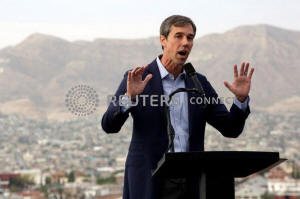|
The
former Texas congressman said that, if elected president he
would immediately eliminate Trump's tariffs against Chinese
goods, demanding in exchange that China revoke its retaliatory
tariffs against American products including soybeans, beef and
cars, which have been hurting U.S. farmers and manufacturers.
O'Rourke, 46, said his trade policy would prioritize American
workers over corporate interests. At the same time, he said he
would lead a global effort, through modernizing the World Trade
Organization, to stop China's anti-competitive behavior.
"Trade is not the problem - Trump is," O'Rourke said in a
statement. "His trade war has been a disaster for American
farmers and workers - but it's on us to offer a compelling
alternative."
Trump has defended his tariff war with China, saying it will
benefit American producers in the long run and that his
get-tough stance with China is hugely popular with his electoral
base.
Trump's trade war with China has been part of a disruptive
overall trade policy. While president he has renegotiated the
NAFTA trade deal with Canada and Mexico, and sought new
bilateral deals with Asian and European nations.
His policies, which run counter to the Republican Party's
traditional embrace of unfettered free trade, have left many
Democratic candidates unsure of how to address the issue. Free
trade agreements such as NAFTA are unpopular with many
Democratic voters because they believe the deal led to the
exporting of U.S. jobs overseas.
Most of the 20 candidates vying to become the Democratic nominee
to take on Trump in next year's November election have attacked
his trade war with China, saying it hurts U.S. workers and
companies. But many also share Trump's view that China uses
unfair trade practices.
Another 2020 Democratic candidate, U.S. Senator Elizabeth Warren
from Massachusetts, released a trade plan last month.
It echoed some of Trump's claims that previous trade deals have
been unfair to American workers, but included more liberal
remedies such as a "border carbon adjustment" tax that would be
levied against imported goods that use a carbon intensive
manufacturing process. She also wants to greatly reduce
corporate America's influence in how trade deals are negotiated.
(Reporting by Tim Reid; Editing by Sandra Maler)
[© 2019 Thomson Reuters. All rights
reserved.] Copyright 2019 Reuters. All rights reserved. This material may not be published,
broadcast, rewritten or redistributed.
Thompson Reuters is solely responsible for this content.

|
|






